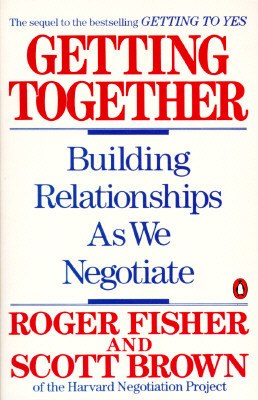Getting Together: Building Relationships as We Negotiate, Part 1
 When presenting for therapy, one of the most common items couples struggle with is communication. The inability to communicate leads to all sorts of misunderstandings, failures to resolve problems and cycles that build up to create significant dissatisfaction with the relationship. Fisher and Brown, of the Harvard Negotiation Project present some fundamental elements of communicating and problem solving in their book Getting Together: Building Relationships as We Negotiate. This book is the sequel to the bestseller Getting to Yes. Although not writing from a therapy background, their work on communication is consistent with what we share with our clients at Fuller Life. Over the next few posts I will try to summarize the contents of their very helpful work.
When presenting for therapy, one of the most common items couples struggle with is communication. The inability to communicate leads to all sorts of misunderstandings, failures to resolve problems and cycles that build up to create significant dissatisfaction with the relationship. Fisher and Brown, of the Harvard Negotiation Project present some fundamental elements of communicating and problem solving in their book Getting Together: Building Relationships as We Negotiate. This book is the sequel to the bestseller Getting to Yes. Although not writing from a therapy background, their work on communication is consistent with what we share with our clients at Fuller Life. Over the next few posts I will try to summarize the contents of their very helpful work.
Part 1 presents an overview of their strategy, including the six basic elements of a good working relationship. In order to get the relationship we want, the relationship must have what it needs – the ability to overcome differences. The ability to deal with differences depends on (1) a balance of emotion and reason, (2) understanding, (3) good communication, (4) reliability, (5) persuasion, not coercion, and (6) mutual acceptance.
A first step in developing this ability is to become aware of the difference between “process” and “substance.” For example, substance is similar to a class one might take in school (geometry, world history, etc.). Process is the method used in teaching the class (lecture, discussion, group projects, etc.). The authors suggest that people have a tendency to focus on what they want (substance) and not on how to get it (process). In relationships, a couple that encounters a difference in choosing a restaurant might tend to focus on their own goal (one wants Tex-Mex and the other wants BBQ) and neglect the process of resolving the difference (yelling, arguing, threatening, etc.). When conflict arises, prioritizing substantive goals (getting what I want) over process (the way we overcome conflict) is a shortsighted strategy that damages the relationship.
The strategy Fisher and Brown promote is based on a commitment to be unconditionally constructive. “Do only those things that are both good for the relationship and good for us, whether or not they reciprocate” (38). Regardless of what the other person does or does not do, a good relationship partner needs to make a commitment to be unconditionally constructive.
Look for our upcoming posts on the six basic elements of a good working relationship!
It is our desire at Fuller Life Family Therapy to walk alongside couples as they navigate through relationship misunderstandings and miscommunications. Please contact us if you would like information about our pre-marital and couple’s counseling. If you like this article, please like us on Facebook and pass it on to other couples!
Resident Therapist at Fuller Life Family Therapy Institute









